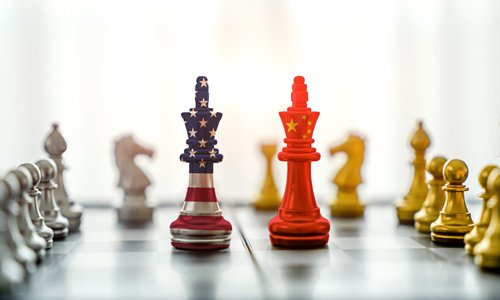HOME >> BUSINESS
Negotiations key to resolving China-US issues like ban on Huawei: AmCham chair
By Chen Qingqing and Bai Yunyi Source:Global Times Published: 2019/11/2 20:28:16

China US
As national security concerns loom large over Chinese tech giant Huawei, the American Chamber of Commerce in China (AmCham China) Chairman said China and the US must frame rules under which both sides could have sufficient room for business.
"Huawei is a very successful, very advanced company," Tim Stratford, chairman of the AmCham, told the Global Times in an interview on Saturday. Barring Huawei from taking part in the US 5G construction and rollout reflects the country's concerns that the Chinese company might take control of the telecom infrastructure that is at the center of the economic activities.
According to Stratford, striking a balance between national security concerns and at the same time collaborating with advance technologies is difficult. "Develop some ways of doing things so that we can have as much space for doing business as possible," he added.
The Trump administration has banned Huawei from taking part in building 5G networks in the US by citing national security risks while pushing forward a global crackdown campaign on the Chinese firm.
"This is a structural problem that our government officials have to deal with," the chairman said, noting that ultimately, officials from both sides need to sit down and build a consensus on these areas.
Stratford said he is hopeful of the US and China managing their differences, and that both countries should be able to cooperate in multiple areas that are beneficial for the people of both countries, in spite of unanswered questions. Meanwhile, the business community is pinning their hopes on the governments for a possible solution at the earliest.
Government officials need to initiate a discussion with the business community and representatives from the tech sector to dwell on these questions, and strive for better solutions, officials are expected to acknowledge the suggestions of the business sphere, the chairman said.
The Federal Communications Commission, the US telecoms regulator, plans to vote in November to designate Huawei and ZTE as national security risks, Reuters reported on Tuesday. The move would bar US rural carriers from tapping into an $8.5 billion government fund to purchase equipment or services from the two companies.
However, the Rural Wireless Association in the US earlier estimated that replacing Huawei and ZTE gear would cost between $800 million and $1 billion, as 25 percent of its members have already implemented products from these two companies in their networks, according to media reports. The ban could even lead to a total snapping of networks in some rural regions of the US.
Posted in: ECONOMY